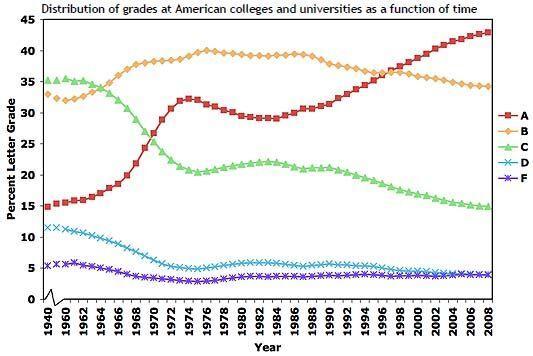That perfect report card many people strive for may be useless as research suggests that rising grade inflation in recent years has diminished the value of top grades.
A recent study found that GPAs have been increasing at a rate of 0.1 points per decade for the last 30 years.
A is now by far the most common grade at both four-year and two-year universities, representing more than 42% of all grades. The total share of A’s has increased 6% every decade, making A’s three times more common than they were in 1960.
If this rise in grades were due to a more innovative, more diligent generation of students, grade inflation wouldn’t be worrying. Just because other students are getting better grades doesn’t mean your achievements are worth any less. However, it seems unlikely that our education system is improving given that America has placed lower every year in rankings of test scores and other measurements.
Instead, the increase in grades is a testament to lower standards, increased cheating and generous test curves.
Think of this relationship as a mathematical function. The right side of the function—the output—represents your grades, and the left side of the function—the input—represents factors like hours spent studying, class attendance, and homework completion, to name a few. Thus, holding all else constant, increasing these factors should improve the output, your grades.
Grade inflation occurs when grades increase while inputs remain the same. Basically, students are putting in the same amount of effort to get their grades but yield a superficially higher return than their parents did in college.
I’m not suggesting that your academic counselor illegally goes into the university’s grade book and changes every minus to a plus. Instead, grade inflation is a systematic phenomenon spurred by lowered standards.
This has been especially true during COVID. When the university transitioned online in spring 2020, grades jumped at astronomically high rates. While the GPA for all undergraduates during the fall 2019 semester was 2.992, it was 3.446 during the spring 2020 semester.
On paper, your grades are better. But, in reality, they’re worse.
Whether grades still matter it is a question for future employers and admission officers. What’s evident, however, is that post-COVID grades will mean much less than they did before.
If you take anything away from reading this, good grades are not a sure path to your dream job or graduate school. Instead, find more meaningful ways to build your resume and set you apart from other candidates because, ultimately, your report card is meaningless.
Samuel Camacho is a 21-year-old economics junior from Maracaibo, Venezuela.
Opinion: Let’s face it, grades don’t matter anymore
September 22, 2021

Note: 1940 and 1950 (nonconnected data points in figure) represent averages from 1935 to 1944 and 1945 to 1954, respectively. Data from 1960 onward represent annual averages in their database, smoothed with a three-year centered moving average.




